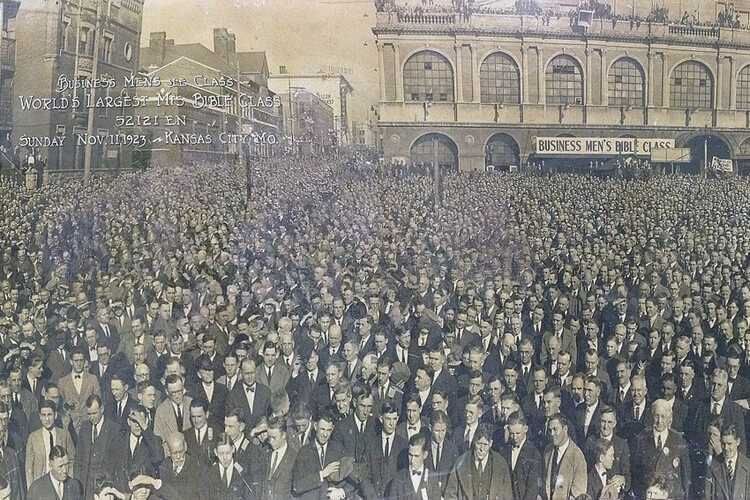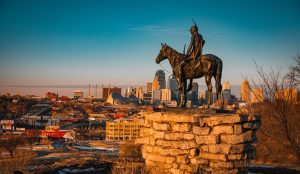Looking at the photo, you see thousands of Christian businessmen—a breathtaking moment in Kansas City history. You see the beauty of unity as Christians from all denominations flooded the streets downtown.
However, here’s what you don’t see:
- a fledgling church plant
- decades of faithful pastors who pushed through setbacks to sustain the church
- One man who chased a vision and built an impossible dream
Looking at history, we love to zoom in on the snow-capped peaks while ignoring the mountains that lifted them up. But if we pay attention to the foundations built throughout history, played out over decades, they will tell us what a single picture cannot.
As we gaze at the 1923 photo of Christians gathered downtown, we would be wise to remember the few who started the movement years earlier, so that we can heed the prophet’s warning, “Do not despise these small beginnings, for the LORD rejoices to see the work begin” (Zech. 4:10 NLT). What becomes a mighty movement often starts decades earlier with a single person.
Small Beginnings of First Baptist Church of Kansas City
The 1923 gathering of 52,121 businessmen would not have been possible if not for First Baptist Church of Kansas City. The church was founded years earlier, in 1855, by a pioneer doctor and missionary. In starting the church, Dr. Johnston Lykins recruited nine other people to join him. The church’s history describes its first years as “a struggle, for the flock was small, the people were nearly all poor, and they had no permanent house in which to hold services.” When they could finally afford to hire a pastor, he died after preaching his first sermon. They found another pastor who served for one year, then the Civil War broke out, and the church stopped meeting altogether.
However, they recruited a third pastor and eventually began meeting again. Lykins allowed him to stay at his house. The church resumed meeting, even holding a revival service as guns fired during the Battle of Westport.
The church persevered and 68 years later held one of the largest Christian gatherings Kansas City had ever seen.

Small Beginnings of the Bible Class
In 1921, Dr. David Evans recruited N. W. Dible to lead the Christian Businessmen’s Bible Class. Dr. Evans had graduated from William Jewell College and was its first alumni to eventually become its president. However, he stepped down from the college presidency to begin pastoring at First Baptist Church of Kansas City. He recruited Dible, and when Dible began leading the class, it had just thirty-five men. But within one year of Dible’s leadership, the class grew to 3,700 members. Dible began researching to see if any other Men’s Bible Class existed larger than his, and then challenged his group to beat their membership. They grew, culminating in the 1923 gathering of over 52,000 men.
Celebrating Small Beginnings
When we celebrate the 52,000 who gathered, do we celebrate the ten people who planted a struggling church? Or the dozens of anonymous pastors who kept it going another 70 years? Or the thirty-five faithful attendees who started the class?
First Corinthians 15:58 says, “Always give yourselves fully to the work of the Lord, because you know that your labor in the Lord is not in vain” (NIV). As Christians, our service to God is never in vain. Most of the leaders of First Baptist Church of Kansas City did not see the fruit of their labor, and the same is true for us today. We plant churches by faith, we start Bible studies by faith, we hold prayer meetings by faith—and we trust that our labor in the Lord is not in vain.
Stories allow us to track the fruit of others’ small beginnings and see what an enormous harvest their efforts brought. As we look at past believers’ faithfulness to obey God and start small, may we be encouraged that a harvest always comes.
When we honor the breathtaking historic events, let’s also honor the small beginnings that made them possible.









